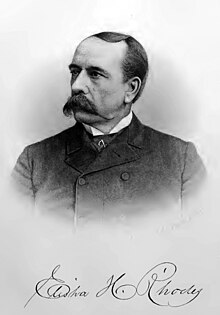Elisha Hunt Rhodes
| Elisha Hunt Rhodes | |
|---|---|
 |
|
| Born |
March 21, 1842 Pawtuxet, Rhode Island |
| Died | January 14, 1917 (aged 74) Providence, Rhode Island |
| Place of burial | Swan Point Cemetery Providence, Rhode Island |
| Allegiance |
United States Union |
| Service/branch | Union Army |
| Years of service | 1861–65 (Army) 1879–93 (Militia) |
| Rank |
Colonel (Army) Brigadier General (Militia) |
| Commands held |
2nd Rhode Island Infantry Rhode Island militia |
| Spouse(s) | Caroline Pearce Hunt |
Elisha Hunt Rhodes (March 21, 1842 – January 14, 1917) was an American soldier who served in the Union Army of the Potomac for the entire duration of the American Civil War, rising from corporal to colonel of his regiment by war's end. Rhodes' illustrative diary of his war service was quoted prominently in Ken Burns' PBS documentary The Civil War.
Rhodes was born in Pawtuxet, Rhode Island, to Captain Elisha H. Rhodes and Eliza A. Chase. He had several sisters and two brothers. At age 14, Rhodes attended Potter and Hammond's Business Academy in Providence.
His father drowned when his schooner, the merchant ship Worcester, was sunk by a hurricane on December 10, 1858. He was buried on Linyards Cay, Abaco in the Bahamas.
Rhodes served with the 2nd Rhode Island Volunteer Infantry throughout its service during the American Civil War.
Rhodes enlisted in the war with his mother's permission. At first he believed war to be an adventure. During the war, he advanced from corporal to lieutenant colonel in command of the regiment.
He enlisted on June 5, 1861 and was appointed to the rank of corporal. He was promoted to sergeant major on March 1, 1862 and to 2nd lieutenant on July 24 of the same year.
On April 15, 1863 he was promoted to 1st lieutenant and placed in command of Company B. He became the regiment's adjutant, with the rank of 1st lieutenant, on November 6, 1863. He served in this capacity until the regiment was reorganized on June 17, 1864.
On June 21, 1864 he was promoted to captain and assigned to Company B but was also ordered to command the regiment, which he did for the remainder of the war. He received a brevet (honorary promotion) to the rank of major on December 5, 1864.
On February 6, 1865 he was promoted to lieutenant colonel and placed in command of the regiment. On April 2 he received a brevet to the rank of colonel in recognition of his service in the Petersburg campaign. He was mustered out of service, along with his regiment, on July 13, 1865.
...
Wikipedia
